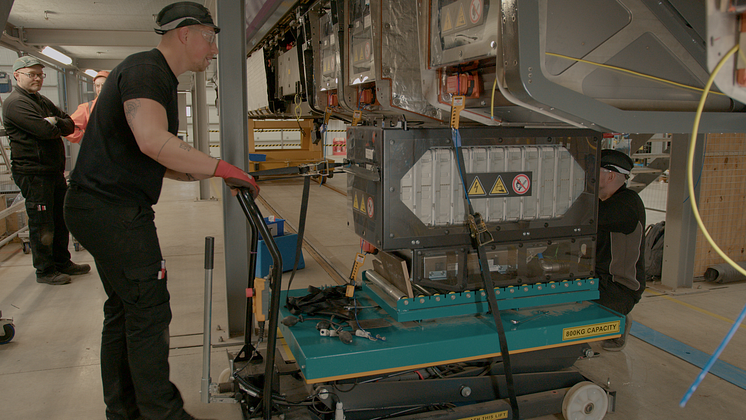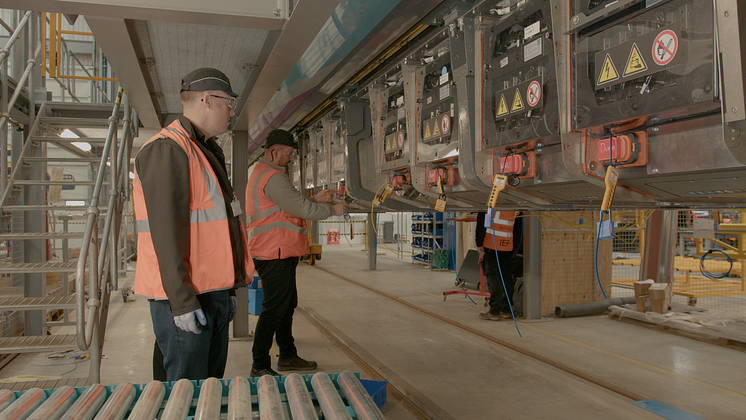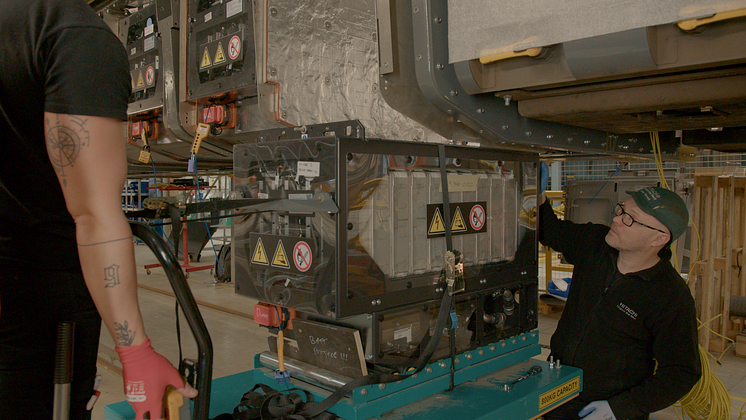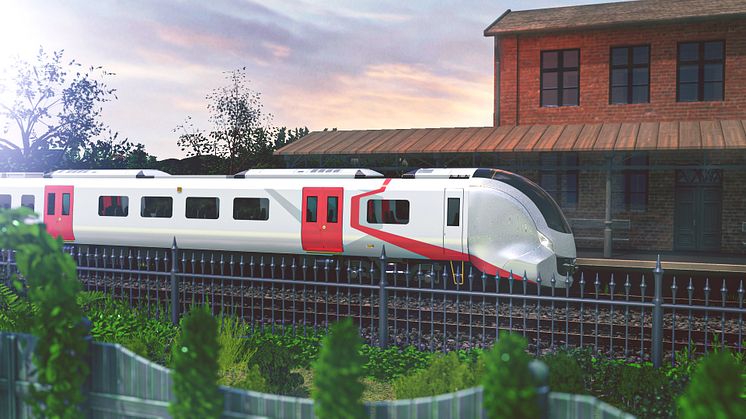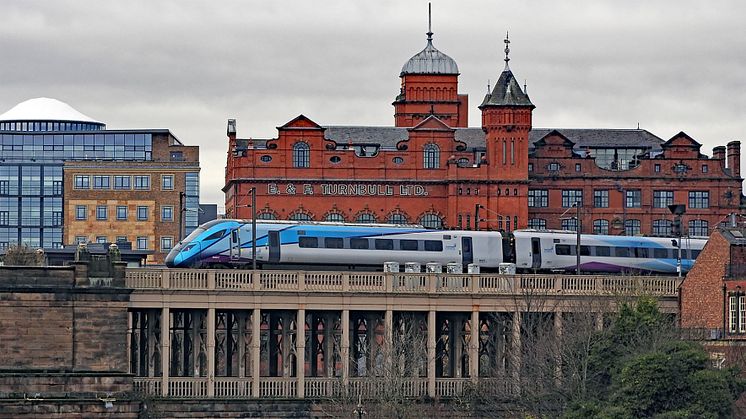
Press release -
Brand new battery technology to be trialled on TransPennine train
- First-ever trial in the UK to replace a diesel engine with a battery on an intercity train is underway.
- Pioneering collaboration between Angel Trains, TransPennine Express, Turntide Technologies and Hitachi Rail.
- Hitachi Rail has built a battery using the North East supply chain, with one battery unit predicted to reduce emissions and fuel costs by as much as 30%.
Testing of the UK’s first intercity battery train commenced earlier today. The battery, which generates a peak power of more than 700kw, has now been successfully retrofitted onto a TransPennine Express ‘Nova 1’ train (five-carriage intercity Class 802), ahead of the trial on Transpennine routes this summer.
This is the first UK trial where a diesel engine is replaced with a battery on an intercity train. The trial is a collaboration between TransPennine Express, Angel Trains and Hitachi Rail.
The single battery unit is incredibly powerful, storing enough electricity to power more than 75 houses for a day. This impressive energy and power density will deliver the same levels of high-speed acceleration and performance, while being no heavier than the diesel engine it replaces.
The installation of a battery will reduce emissions and improve energy efficiency. It is predicted to reduce emissions and fuel costs by as much as 30% on a Hitachi intercity train.
Most importantly for passengers, the trial will test how intercity trains can enter, alight and leave non-electrified stations in zero-emission battery mode to improve air quality and reduce noise pollution.
The battery has been manufactured with Turntide Technologies in Sunderland, utilising the battery sector that has developed in the North East of England.
The trial will provide real-world evidence to inform the business case for a 100% -battery-electric intercity train, capable of running up to 100km in battery mode. This remarkable range means this battery technology could be deployed to cover the final non-electrified sections of intercity routes in the coming years. It will also demonstrate how battery technology can reduce infrastructure costs by reducing the need for overhead wires in tunnel sections and over complex junctions.
Angel Trains, the owner of the Class 802 units, sees this investment in the Hitachi Rail product as extremely important, with the benefits extending to the North East and the broader rail industry. This type of private sector investment in leading edge technology is critical to the success of UK rail.
The trial, and the industrial opportunity presented by battery trains, means rail can help grow the domestic battery sector.
Paul Staples, Engineering, Safety and Sustainability Director at TransPennine Express, said:
“We’re really pleased to be a part of this innovative and critically important trial of battery technology.
“We take our environmental responsibilities seriously and are constantly looking at ways of making rail travel even more sustainable and efficient.
“This trial will allow us to assess the exciting new technology on our Nova 1 train; we’re looking forward to seeing the results and how well the batteries work on our network.”
Matthew Prosser, Asset Management Director at Angel Trains, said:
“This project represents a significant investment in one of our newest fleets. It will both support and draw upon the skilled jobs and expertise at Hitachi’s Newton Aycliffe facility and enable us to demonstrate how battery retrofit technology can help us decarbonise our railways.”
Jim Brewin, Chief Director UK & Ireland at Hitachi Rail, said:
“Hitachi has invested more than £15 million in research and development to deliver a ‘UK first’ in battery train technology. Collaborating closely with our partners, Angel Trains and TransPennine Express, we are committed to showcasing how the rail industry can significantly lower costs and emissions. This is an important next step towards a more energy efficient and greener railway.”
The development of the battery is an excellent example of Japan-UK engineering alliance, with Hitachi Rail investing more than £15 million to co-develop the battery system with Turntide Technologies in the North East.
Once assembled, the battery pack was shipped from the UK to Japan, where it underwent robust testing by Hitachi’s battery train experts who previously delivered the world’s first passenger battery train in 2016.
The successful completion of testing in Japan, paved the way for the UK rail industry collaboration, with Angel Trains, TransPennine Express and Hitachi Rail combining forces to help decarbonise and modernise the railways.
Mark Cox, General Manager of Turntide Technologies transport business unit said: "We are incredibly proud to be part of this ground-breaking project, co-developing one of the world's most powerful passenger train batteries with our esteemed partners at Hitachi Rail.
The successful development and production of this high-performance battery at our Sunderland facility further highlights the key role we play in the UK’s industrial landscape. We believe this clean technology will revolutionise the rail industry, not only in the UK but around the globe.”
This important project draws upon Hitachi’s global expertise which includes delivering the world’s first passenger battery train in Japan, and rolling out the Masaccio, Europe’s first battery hybrid train in Italy in 2022. The evolution of the technology continues at pace with Hitachi Rail recently unveiling its new intercity version of the train, and with a target to roll out a EuroMasaccio in additional European markets, including Germany from 2026.
The development of this battery is an important step for the rail industry both home and abroad. Hitachi Rail has an ambition to install this battery on trains around the world, potentially creating a UK export and improving energy efficiency.
There are thousands of trains running across the world that are powered by diesel engines, which will need to be decarbonised to meet net zero targets. In Italy, the Masaccio has instantly cut CO2 emissions by 50% compared to the diesel trains it has replaced. The ability to replace diesel engines with a powerful battery, and unlock cheaper partial electrification, can create a low-cost pathway to decarbonise railways around the world.
ENDS
For more information, please contact:
Douglas McIlroy, Hitachi Rail
+44 7548 238 140
douglas.mcilroy@hitachirail.com
Note to Editors:
- Supporting images can be downloaded here
- More information on Hitachi battery solutions can be viewed here
- The engineering work ahead of the trial will take place at Hitachi Rail’s manufacturing facility in Newton Aycliffe.
- Hitachi has been collaborating with Turntide Technologies since 2020
- Hitachi Rail battery technology draws upon the pioneering technology, utilising battery cells from Turntide Technologies, providing the optimised battery size and density required to meet performance and weight criteria.
- Hitachi Rail’s unique battery system is modular, and can be scaled up or down depending on the performance requirement for individual needs of a route, including topography, timetabling or access to charging infrastructure.
- More information on Hitachi Energy’s fast charging solution can be viewed here
- More information on Hitachi Rail’s Japanese commuter battery train - here
- More information on Hitachi Rail’s Italian battery hybrid train - here
- A potential 30% fuel cost saving and emission reduction is based on a current 5-carriage intercity train which has three diesel engines installed. The removal of one diesel engine will reduce diesel costs by up to 30%. This projection is based on 2022 fuel prices and does not factor in potential rising diesel costs
- Powering more than 75 houses was calculated using Ofgem figures of electricity usage of an average home.
Topics
Categories
About Hitachi Rail:
Hitachi Rail is connecting the future of mobility - helping every passenger, customer and community enjoy the benefits of more seamless, sustainable transport.
With innovative technology and world-leading delivery capabilities, Hitachi Rail is a trusted partner to customers and consortia partners globally. The company is an expert in every part of the railway: from train manufacturing and maintenance to digital signalling and smart mobility. Its pioneering products, such as the iconic high speed bullet train, enable billions of passenger journeys and the transport of millions of tonnes of freight, every year.
Drawing on the powerful expertise of the wider Hitachi group companies, Hitachi Rail is uniquely placed to further enhance its offer to customers through pioneering new digital solutions and services.
In FY22, Hitachi Rail had revenues of over €5bn. The company has around 15,000 employees in 38 countries, and it invests in its diverse and talented teams.
Hitachi Rail’s business is local, but its reach is global. With deep roots in its communities, the company is committed to delivering sustainable progress for all.
Find out about more by visiting hitachirail.com



